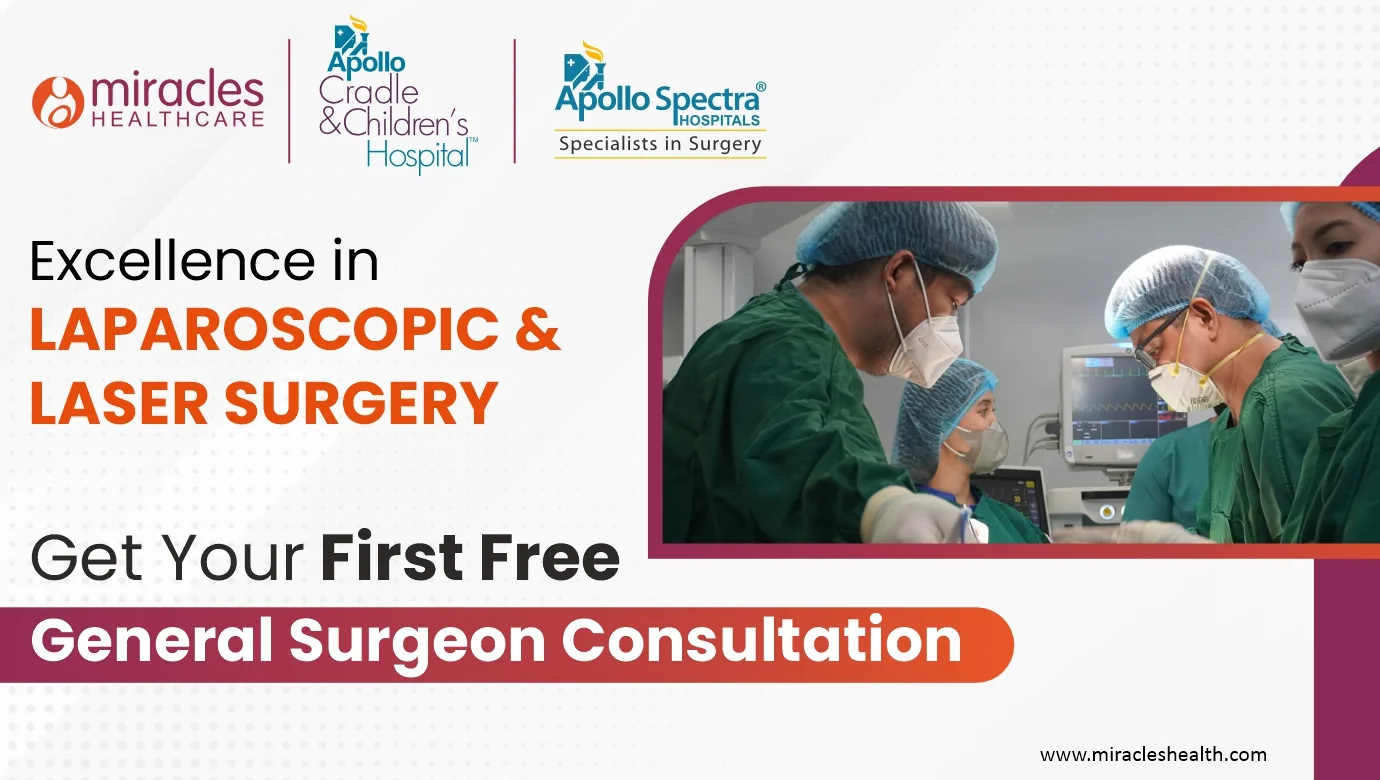General Surgery Conditions We Treat
Comprehensive Care for Your Health

Endoscopic surgery is a minimally invasive procedure that uses an endoscope. It is a thin, flexible tube with a camera and light to access and operate on internal organs through small incisions. This technique allows for reduced recovery time, minimal scarring, and a lower risk of complications compared to traditional open surgery. Endoscopy surgery is commonly used for diagnostic and therapeutic procedures across various medical fields.
Endoscopic surgery is a modern, minimally invasive surgical technique that involves using an endoscope to examine and treat conditions within the body. The procedure is performed through small incisions, allowing the surgeon to view internal organs and tissues on a monitor in real time. Specialized surgical instruments are passed through the endoscope to perform tasks like removing tissue, repairing damage, or taking biopsies.
Endoscope operation is used in various medical fields, including gastroenterology, gynecology, urology, and orthopedics. Its advantages include shorter recovery times, less postoperative pain, reduced scarring, and a lower risk of complications compared to traditional open surgery.
Endoscopic surgery is required for several reasons:
Diagnosis: It allows doctors to visually examine internal organs and tissues, aiding in diagnosing conditions like tumors, ulcers, and other abnormalities that may not be easily detectable through non-invasive imaging methods.
Treatment: The surgical endoscopy provides a less invasive option to treat various conditions, such as removing polyps, gallstones, or tumors, repairing damaged tissues, and addressing blockages or bleeding.
Minimally Invasive: It is chosen to perform complex procedures with minimal trauma to the body, leading to faster recovery, less pain, and minimal scarring.
Preventive Care: It can be used to prevent the progression of diseases by removing precancerous tissues or addressing early-stage conditions before they become more serious.
Endoscopic surgery involves minimally invasive procedures performed using an endoscope, a thin, flexible tube with a camera and light. Here are the main types of endoscopic surgeries:
Arthroscopy: Used to diagnose and treat joint problems, such as torn ligaments, cartilage damage, or joint inflammation.
Laparoscopy: Performed in the abdominal or pelvic cavity to treat conditions like gallbladder issues, hernias, or gynecological disorders.
Upper GI Endoscopy (Gastroscopy): Used to examine and treat conditions of the esophagus, stomach, and upper intestines, such as ulcers or bleeding.
Colonoscopy: Focuses on the colon and rectum to screen for polyps, cancers, or other gastrointestinal issues.
Bronchoscopy: Examines the lungs and airways to diagnose or treat conditions like blockages, infections, or tumors.
Hysteroscopy: Performed to diagnose and treat uterine conditions, including fibroids, polyps, or abnormal bleeding.
Sinus Endoscopy: Used to treat chronic sinusitis or remove polyps from nasal passages and sinuses.
Cystoscopy: Focuses on the bladder and urinary tract to diagnose or treat problems like bladder stones or tumors.
These surgeries offer quicker recovery times, smaller scars, and less pain compared to traditional open surgeries.
Preparing for endoscopy surgery involves several important steps to ensure a safe and successful procedure:
Follow Pre-Surgery Instructions: Your doctor will provide specific instructions, such as fasting for a certain period before the surgery. Generally, you may need to avoid eating or drinking for 6-12 hours before the procedure.
Medications: Inform the surgeon about any medications, supplements, or herbal remedies, you are taking. You may be asked to stop certain medications, especially blood thinners, before the surgery.
Medical History: Provide a complete medical history, including any allergies, previous surgeries, or chronic conditions, to help the surgical team plan your care.
Wear Comfortable Clothing: On the day of surgery, wear loose, comfortable clothing that is easy to remove. Avoid wearing jewelry, makeup, or contact lenses on the day of surgery.
Relax and Ask Questions: Make sure you understand the procedure, risks, and recovery process. Don’t hesitate to ask your surgeon any questions you may have to ease any concerns.
By following these guidelines, you can help ensure a smooth experience and a quicker recovery.
The procedure of endoscopy surgery typically involves the following steps:
Anesthesia: Depending on the type of endoscopic surgery, you may receive local, regional, or general anesthesia to keep you comfortable during the procedure.
Insertion of the Endoscope: The endoscope is gently inserted into the body through a natural opening such as the mouth, nose, or anus or a small incision in the skin. The camera on the endoscope sends real-time images to a monitor, allowing the surgeon to view the area being treated.
Surgical Procedure: Specialized instruments may be passed through the endoscope to perform the surgery. This can include cutting tissue, removing polyps or tumors, taking biopsies, or repairing damaged areas.
Monitoring and Adjustments: The surgeon closely monitors the procedure on the screen, making clear movements and adjustments as needed to complete the surgery safely and effectively.
Completion and Removal: Once the surgery is complete, the instruments and endoscope are carefully removed. If an incision is made, it is usually small and may require only a few stitches or a bandage.
Recovery: After the endoscopy procedure, you will be monitored as the anesthesia wears off. Most patients can go home the same day, but specific post-operative care instructions will be provided to ensure a smooth recovery.
Endoscopic surgery is valued for its precision and minimally invasive nature, leading to shorter recovery times and fewer complications compared to traditional open surgery.
The right candidate for endoscopy surgery is typically someone who meets the following criteria:
Medical Condition: The individual has a condition such as gastrointestinal issues (polyps, ulcers), gallstones, certain types of tumors, gynecological conditions, joint problems, etc. that can be effectively diagnosed or treated through minimally invasive techniques.
Overall Health: The candidate is generally in good health, with no severe underlying conditions that could complicate the surgery, such as uncontrolled diabetes, severe heart disease, lung disease, or blood clotting disorders.
Non-Responsive to Conventional Treatments: The patient has tried non-surgical treatments, such as medications, physical therapy, or lifestyle changes, without sufficient improvement, making surgery the next appropriate step.
Desire for Minimally Invasive Options: The patient prefers a minimally invasive approach due to the benefits of shorter recovery times, less pain, and minimal scarring compared to traditional open surgery.
No Contraindications: There are no contraindications, such as certain anatomical challenges or extensive scarring from previous surgeries, that would make endoscopic surgery difficult or risky.
Age and Weight Considerations: While age is not a strict barrier, older adults and those with obesity may need a more thorough evaluation to ensure that endoscopic surgery is safe for them.
A thorough consultation with a general surgeon is important to determine if endoscopic surgery is the best option based on the individual's specific medical condition, overall health, and surgical goals.
After endoscopic surgery, patients can generally expect the following:
Recovery Time: Most people experience a quicker recovery compared to traditional surgery. Depending on the procedure, you might be able to return to normal activities within a few days to a couple of weeks.
Postoperative Care: Follow your doctor’s instructions for post-surgery care, which may include managing any discomfort with prescribed pain relievers, caring for any small incisions or wounds, and monitoring for signs of infection.
Diet and Activity: You may need to follow a specific diet or activity restrictions initially. You might be advised to start with clear liquids and gradually progress to solid foods. Light activities are usually recommended, avoiding heavy lifting or strenuous exercises.
Follow-Up Appointments: Attend any scheduled follow-up visits to monitor your recovery, check for any complications, and discuss any further treatment or lifestyle adjustments.
Possible Side Effects: Mild discomfort, bloating, or nausea may occur, depending on the type of endoscopic surgery performed. These symptoms are typically temporary and should decrease as you heal.
Watch for Complications: Be aware of any signs of complications, such as severe pain, excessive bleeding, fever, or constant nausea. Contact your surgeon if you experience any concerning symptoms.
Resuming Normal Activities: Most patients can resume normal activities fairly quickly, but it’s important to follow your surgeon's guidance on when you can return to work or more intense physical activities.
Overall, the recovery process is generally smoother and faster with endoscopic surgery, allowing patients to return to their daily routines with minimal disruption.
After endoscopic surgery, taking appropriate care is important for a smooth recovery and to minimize the risk of complications. Here are key care instructions to follow:
Follow Medical Advice: Adhere to your doctor’s specific instructions regarding post-operative care, including medication, diet, and activity restrictions.
Manage Pain: Use prescribed pain medications or over-the-counter pain relievers as directed to manage discomfort. Avoid taking any medication not approved by your surgeon.
Monitor Incisions: Keep any incisions or wound sites clean and dry. Follow instructions for changing dressings if applicable and watch for signs of infection, such as redness, swelling, or discharge.
Diet and Hydration: Start with clear liquids and gradually reintroduce solid foods as tolerated. Stay well-hydrated and avoid foods that may be hard to digest initially.
Rest and Activity: Get plenty of rest and avoid strenuous activities or heavy lifting for the period recommended by your surgeon. You can perform light activities, such as walking to promote circulation.
Follow-Up Appointments: Attend all scheduled appointments with the doctor to ensure proper healing and address any concerns. Your surgeon will check your recovery progress and provide further instructions if needed.
Watch for Complications: Be vigilant for any signs of complications, such as severe pain, excessive bleeding, fever, or constant nausea. Consult your surgeon immediately if you experience any of the signs.
Gradual Return to Activities: Follow your surgeon's advice on when to gradually resume normal activities and exercise. Avoid returning to high-impact or strenuous activities too soon with the recommendation of your surgeon.
By following these care instructions, you can help ensure a successful recovery and reduce the risk of complications after endoscopic surgery.
Endoscopic surgery offers several advantages over traditional open surgery, making it a preferred choice for many patients and surgeons. The key advantages of endoscopic surgery include:
Minimally Invasive: The procedure involves small incisions or natural openings, leading to less trauma to the body compared to open surgery.
Faster Recovery: Patients generally experience shorter hospital stays and quicker recovery times, allowing them to return to normal activities sooner.
Reduced Pain and Scarring: Smaller incisions result in less postoperative pain and minimal scarring, improving the cosmetic outcome.
Lower Risk of Complications: The minimally invasive nature of endoscopic surgery reduces the risk of complications such as infections, blood loss, and wound healing issues.
Precision: The use of a camera-equipped endoscope provides high-definition, magnified views of the surgical area, allowing for more precise and accurate procedures.
Less Blood Loss: Smaller incisions and precise surgical techniques lead to less blood loss during the procedure.
Outpatient Option: Many endoscopic surgeries can be performed on an outpatient basis, meaning patients can go home the same day.
Better Postoperative Outcomes: Patients often experience a quicker return to normal function and fewer long-term complications.
These advantages make endoscopic surgery a highly effective and patient-friendly option for many medical conditions.
Endoscopic surgery, while generally safe and minimally invasive, carries certain risks, as with any surgical procedure. These risks associated with endoscopic surgery can vary depending on the type of surgery and the patient's overall health. Common risks associated with endoscopic surgery include:
Infection: There is a small risk of infection at the site where the endoscope is inserted or within the body, especially if tissue is removed or manipulated during the procedure.
Bleeding: Some endoscopic surgeries involve cutting or removing tissue, which can lead to bleeding. In most cases, this is minor and manageable, but in rare cases, it may require further medical attention.
Perforation: The insertion of the endoscope or surgical instruments can sometimes cause a tear or perforation in the organ or tissue being examined. This may need additional surgical procedures to repair.
Adverse Reaction to Anesthesia: If general anesthesia is used, there is a risk of an adverse reaction, which can include allergic reactions, breathing difficulties, or other complications related to anesthesia.
Organ or Tissue Damage: Although the procedure is performed with precision, there is a risk of unintentional damage to surrounding organs or tissues.
Blood Clots: As with any surgery, there is a risk of developing blood clots, especially if the patient is immobilized for a long period.
Complications from Pre-Existing Conditions: Patients with certain pre-existing medical conditions, such as heart disease or respiratory issues, may be at higher risk for complications during or after the surgery.
It's important to discuss these risks with your doctor before the procedure, as they can provide guidance based on your specific health situation and the type of endoscopic surgery being performed.
The cost of endoscopic surgery can vary widely based on several factors:
Type of Procedure: The complexity and length of the endoscopic surgery, such as diagnostic versus therapeutic procedures, can affect the cost. More complex procedures often cost more due to the need for advanced technology and specialized skills.
Hospital: The cost may vary depending on whether the surgery is performed at a hospital, surgical center, or outpatient clinic. Facilities with higher standards of care or advanced technology might charge more.
Anesthesia: The type of anesthesia used (local, regional, or general) and the duration of its use can impact the overall cost.
Surgeon’s Fees: The experience and reputation of the surgeon performing the procedure can influence the cost of the endoscopic procedure. More experienced or specialized endoscopic surgeons may charge higher fees.
Geographic Location: The cost of surgery varies by region, with urban areas or regions with higher living costs typically having higher prices.
Preoperative and Postoperative Care: Costs associated with preoperative assessments, postoperative care, and follow-up visits can add to the total expense.
Insurance Coverage: The extent of your health insurance coverage and whether the procedure is considered medically necessary can significantly impact your out-of-pocket costs.
Hospital Stay: The need for an overnight stay or longer in a hospital versus an outpatient procedure can affect the total cost.
Additional Services: Costs for any additional services such as diagnostic imaging, lab tests, or additional treatments may also contribute to the overall expense.
It’s advisable to discuss the estimated costs and payment options with your surgeon and insurance company before the procedure to understand your financial responsibilities.
Miracles Apollo Cradle/Spectra is the best hospital for endoscopic surgery in Gurgaon, offering state-of-the-art facilities and a team of highly skilled general surgeons in Gurgaon who specialize in minimally invasive procedures. With advanced technology and a patient-centric approach, the hospital ensures faster recovery times, minimal scarring, and reduced post-operative pain. Whether you need diagnostic or therapeutic endoscopic procedures, we provide personalized care, ensuring the highest standards of safety and precision. If you are considering endoscopic surgery, book your consultation today with a general surgeon near you and experience the best in care as your health deserves nothing less than excellence.


Comprehensive Care for Your Health
Meet our expert team of General Surgeon where compassionate care meets expertise.
Inspiring Journeys: True Patient Stories
Miracles Apollo Cradle is a leading Maternity Hospital Gurgaon. We strive to give the best care to our patients.






Your Health, Our Network: Comprehensive Care Across Every Facility.
Learn about the world class health care we provide
Expert Advice and Health Tips
Learn about the world class health care we provide
Endoscopic surgery is used for diagnosing and treating conditions within the body using a flexible tube with a camera, often involving minimal incisions.
While endoscopic surgery is less invasive, it is still a serious procedure requiring expertise and care, especially for complex conditions.
Endoscopy is generally considered a minor procedure, but it can be major depending on the complexity of the condition treated.
Yes, but it's recommended to start with light meals and avoid heavy or spicy foods immediately after the procedure.
Endoscopic surgery is generally not painful, as it is performed under anesthesia, though mild discomfort may occur during recovery.
Yes, endoscopic surgery is generally safe, with a lower risk of complications compared to traditional surgery.
Individuals with severe cardiovascular issues, respiratory problems, or bleeding disorders may not be suitable for endoscopy.
The cost of endoscopic surgery in Gurgaon varies, typically depending on the complexity and hospital. To know the endoscopic surgery cost, consult the general surgeon near you.